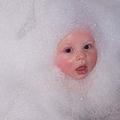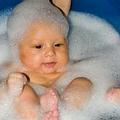 根據「美國消費者團體安全化妝品聯盟」發佈的產品測試結果,許多兒童洗髮精和沐浴產品含致癌化學物甲醛和1,4二氧雜環己烷。該組織說,這些化學成份不受標籤法管制,因此未揭露在產品標籤上。
根據「美國消費者團體安全化妝品聯盟」發佈的產品測試結果,許多兒童洗髮精和沐浴產品含致癌化學物甲醛和1,4二氧雜環己烷。該組織說,這些化學成份不受標籤法管制,因此未揭露在產品標籤上。
這項研究是第一份記載兒童沐浴用品普遍含有甲醛和1,4二氧雜環己烷的文獻。這項研究所測試的多項產品同時含有這兩種化學成份。
如同眾所周知,甲醛和1,4二氧雜環己烷會引發動物罹患癌症,且美國環保署更將其列入可能使人致癌的物質。該機構更指出,嬰兒比成年人對該致癌物更敏感。甲醛也會引發一些兒童皮膚疹。
「根據最近的數據顯示,甲醛和會釋放甲醛的防腐劑-季銨鹽-15,是兒童接觸性皮膚炎重要的過敏源和決定因素,將這些化學物質自兒童產品中去除是較謹慎的作法。」加州大學聖地牙哥分校醫學和小兒科助理教授和Rady兒童醫院接觸性皮膚炎專家雅各(Sharon Jacob)說。
美國消費產品安全委員會說,「即使是微量汙染物,1,4二氧雜環己烷的存在已讓大家憂心。」紐約州參議員吉力布蘭德(Kirsten Gillibrand)已要求美國食品藥物管理局(U.S. Food and Drug Administration,FDA)調查針對嬰兒和孩童銷售之個人護理產品的污染物。「作為兩個孩童的母親,我期望我家所使用的嬰兒和兒童產品是安全的。我無法接受FDA未如同其規範食品藥物般地管制個人護理產品。」她說。
在3月20日陳述中,食品藥物管理局說它並未建立或建議對於1,4二氧雜環己烷在化妝品內的含量提出具體限制。「微量成份在化妝品中含量極低,他們只存在於和皮膚短暫接觸的產品並迅速蒸發。」該機構說。
「我們提供製造商指導原則,提醒他們注意健康議題,並透過一種在聚合過程最後階段,稱做「真空去除」的過程,使1,4二氧雜環己烷含量減至最小。我們在公開的「化妝品製造過程檢查指導原則」中提供食品藥品管理局檢查員相關訊息。當進行檢查時,他們將知道該注意什麼和問什麼問題。」機構說。
 「如果食品藥品管理局確定存在有對健康不利的危害,它將建議該產業和社會大眾,並盡其所能採取的法律行動來保護消費者的健康和福利。」機構說。
「如果食品藥品管理局確定存在有對健康不利的危害,它將建議該產業和社會大眾,並盡其所能採取的法律行動來保護消費者的健康和福利。」機構說。
產業組織「個人護理產品委員會」說,對於普遍使用的嬰兒產品遭致癌化學成份污染的陳述是明顯錯誤的,是活躍份子可恥且憤世嫉俗地煽動並捕捉父母們的擔憂,以推動政治、立法和法律議題。
「當化學成份出現時,它們很可能是在極低的水準下被發現。 因為公司配方和生產過程中,已竭盡全力確保產品對孩子而言,是安全、溫和,且能防止有害的細菌滋生。」委員會說。
「與他們嘗試將該報告定位為最新的且科學的新發現恰好相反,該報告沒有特別的啟發或科學客觀觀點。」「個人護理產品委員會」首席科學家,貝雷博士(John Bailey)說。
「美國食品藥品管理局的化妝品成分複檢單位,一個專門負責評估美國化妝品和個人護理產品成份安全性,由科學和醫學專家組成的獨立小組,以及世界的其他權威機構,長期以來已知道在個人護理產品潛存的1,4二氧雜環己烷和甲醛,並發現當含量低時,它們是安全的。」貝雷說。
「美國消費者團體安全化妝品聯盟」的報告仍然引起世界各國的警覺。中國和越南政府自行進行安全測試,發現部份嬰幼兒沐浴產品糟甲醛和1,4二氧雜環己烷污染。一些主要的中國、台灣,和越南零售商已將這些產品下架,然而美國零售業者尚未跟進。
以色列衛生部已經聲稱受致癌物污染的美國嬰兒產品不得在以色列出售。歐盟已經禁止在個人護理產品中添加1,4二氧雜環己烷,並回收發現含有此化學成份的產品。日本和瑞典也禁止在被個人護理產品中添加甲醛,歐盟和加拿大也加以限制。
「美國再次在保護兒童健康的相關行動上落後。美國欠缺安全標準是美國公司的一大缺點。我們需要更新的法律確保美國產品達到最高安全標準並遠離有毒的化學成份。」乳癌基金會以及聯盟協調者艾雀(Lisa Archer)說。
Dozens of children's shampoos and bath products contain the cancer-causing chemicals formaldehyde and 1,4-dioxane, according to product test results released by the Campaign for Safe Cosmetics. The chemicals are not disclosed on product labels because they are exempt from labeling laws, the organization says.
This study is the first to document the widespread presence of both formaldehyde and 1,4-dioxane in bath products for children. Many products tested for this study contained both ot the chemicals.
Formaldehyde and 1,4-dioxane are known to cause cancer in animals and are listed as probable human carcinogens by the U.S. Environmental Protection Agency, which points out that babies are far more sensitive to carcinogens than adults. Formaldehyde also can trigger skin rashes in some children.
"Given the recent data showing that formaldehyde and the formaldehyde-releasing preservative, quaternium-15, are significant sensitizers and causal agents of contact dermatitis in children, it would be prudent to have these removed from children's products," said Sharon Jacob, M.D., assistant professor of medicine and pediatrics at the University of California San Diego and contact dermatitis specialist at Rady Children's Hospital.
The U.S. Consumer Product Safety Commission says that "the presence of 1,4-dioxane, even as a trace contaminant, is cause for concern."
Senator Kristen Gillibrand of New York has demanded that the U.S. Food and Drug Administration investigate contaminants in personal care products marketed for babies and young children. "As a mother of two young children, I expect the baby and child products my family uses to be safe," she said. "I find it to be unacceptable that the FDA does not regulate personal care products, as it does food and drugs."
In a statement today, the FDA said it has not established or recommended a specific limit on the level of 1,4-dioxane in cosmetics. "The trace levels in cosmetics are extremely low, they are present in products that are only in brief contact with the skin, and the compound evaporates quickly," the agency said.
"We have provided guidance to manufacturers alerting them to the health concerns and how to minimize 1,4-dioxane by means of a process called 'vacuum stripping' at the end of the polymerization process," the agency said. "We provide FDA inspectors with information on this procedure in our publicly available Guide to Inspections of Cosmetic Product Manufacturers so that when they conduct inspections they will know what to look for and what questions to ask."
"If FDA were to determine that a health hazard exists, it would advise the industry and the public, and would consider its legal options for protecting the health and welfare of consumers," the agency said.
The Personal Care Products Council, an industry group, says the allegations that commonly used baby products are contaminated with harmful levels of carcinogenic chemicals "are patently false and a shameful and cynical attempt by an activist group to incite and prey upon parental worries and concerns in order to push a political, legislative and legal agenda."
"When present," the council said, "these chemicals would likely be found at very low levels precisely because companies have gone to great lengths in the formulation and manufacturing processes to ensure that the products are safe and gentle for children and also protected from harmful bacterial growth."
"Contrary to their attempt to position this report as something new and scientifically noteworthy, there is nothing revelatory or scientifically objective in it," said Dr. John Bailey, chief scientist for the Personal Care Products Council.
"The U.S. Food and Drug Administration, the Cosmetic Ingredient Review, an independent panel of scientific and medical experts who assess the safety of ingredients used in U.S. cosmetic and personal care products, and other authoritative bodies throughout the world have long been aware of the potential presence of 1,4 dioxane and formaldehyde in personal care products and found them to be safe when present at low levels," Bailey said.
Still, the Campaign for Safe Cosmetics' report has triggered alarm around the world. The governments of China and Vietnam are conducting their own safety tests on some baby bath products found to be contaminated with formaldehyde and 1,4-dioxane.
Some major Chinese, Taiwanese and Vietnamese retailers have pulled these products from their shelves, although U.S. retailers have not. The Israeli Health Ministry has stated that U.S. baby products with carcinogenic contaminants are not sold in Israel.
The European Union has banned 1,4-dioxane from personal care products and has recalled products found to contain the chemical. Formaldehyde is banned from personal care products in Japan and Sweden, and restricted in the European Union and Canada.
"Once again, the U.S. is lagging when it comes to protecting children's health," said Lisa Archer of the Breast Cancer Fund and coordinator of the Campaign. "The lack of safety standards in the U.S. is disadvantaging American companies. We need updated laws to ensure that American products meet the highest bar of safety and are free of toxic chemicals."

